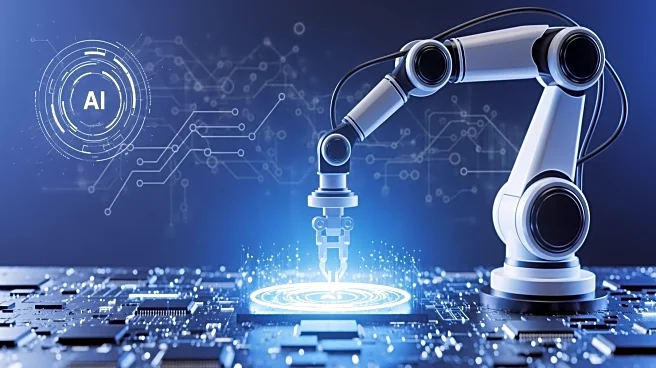What's Happening?
Meta has announced a reduction of 600 positions within its Meta Superintelligence Labs group. This move is part of a broader trend among major AI companies, including Google and Broadcom, which are also
cutting jobs. The layoffs at Meta are attributed to a strategic shift from 'AI research mode' to 'AI productization mode.' As Meta transitions, it is consolidating its numerous AI initiatives, which include Llama, infrastructure, content moderation, recommendation systems, and ad optimization. The job cuts primarily affect overlapping research or support teams, as the company now relies more on automated processes to maintain its operations. This restructuring reflects a change in the cost structure of the tech industry, driven by advancements in AI that automate many tasks previously performed by humans.
Why It's Important?
The reduction in workforce at Meta highlights a significant shift in the tech industry, where AI is increasingly automating roles that were once essential. This trend is not indicative of a downturn in business but rather a transformation in operational efficiency. As AI systems become more capable, companies like Meta can reduce their reliance on human labor for repetitive and coordination tasks. This shift could lead to a redefinition of job roles within the tech sector, potentially impacting employment patterns and skill requirements. While companies may benefit from reduced operational costs and increased efficiency, the workforce may face challenges in adapting to these changes, necessitating reskilling and upskilling to remain relevant in the evolving job market.
What's Next?
As Meta and other AI giants continue to streamline their operations, the focus will likely shift towards maximizing the efficiency and monetization of AI technologies. This could lead to further investments in AI infrastructure and the development of new AI-driven products and services. For employees, this means a potential need to adapt to new roles that emphasize creativity, strategic thinking, and oversight of AI systems. Policymakers and educational institutions may also need to address the growing demand for AI-related skills and training programs to prepare the workforce for the future landscape of the tech industry.
Beyond the Headlines
The ongoing automation of technical and operational roles by AI systems raises ethical and societal questions about the future of work. As AI continues to replace human labor, there is a need to consider the implications for job security, income distribution, and social equity. Companies and governments may need to explore policies that support workers displaced by automation, such as universal basic income or job transition programs. Additionally, the concentration of AI capabilities within a few major companies could lead to concerns about market dominance and the need for regulatory oversight to ensure fair competition and innovation.









